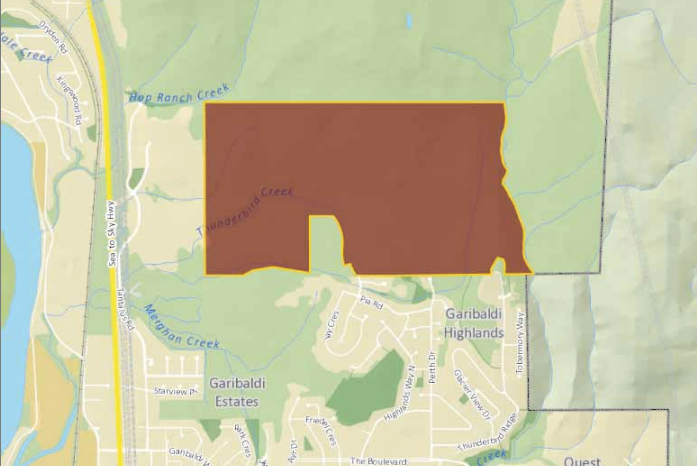Owners of one of the largest pieces of privately owned, undeveloped land in Squamish say they will not allow recreationalists to cross through their 400-acre property until Squamish council allows them to develop it.
The property, owned by the Cheema family, is located north of Garibaldi Highlands and west of Mashiter Creek.
Popular mountain biking and running trails traverse the land that connects the upper Highlands with Alice Lake Park trails. The move to block access to the trails on the property could impact major sporting events in Squamish including Spakwus 50 Marathon Mountain Bike Race, the Squamish Triathlon and the BC Bike Race.
Development is currently restricted on properties, known officially as District Lots 509 and 510, until the community reaches a population of 22,500.
The issue is slated to come before council on Tuesday after Coun. Susan Chapelle put forward a motion March 7 to consider dropping the cap from the Official Community Plan.
Mayor Patricia Heintzman said the issue of the Cheema lands and the cap was set to come up in April anyway as part of the current review of the Official Community Plan.
Originally the cap was put in place to help constrain growth into a large undeveloped area. Municipalities use the mechanism of a cap to protect the environment and because it is expensive for cities to put in infrastructure and servicing into undeveloped areas, Heintzman explained.
Development growth has to have the tax base to support it, Heintzman added. She said she welcomes the public and council discussion around what should happen on with the Cheema lands.
“It is worthy of a lot of discussion because it is a whole discussion about urban sprawl and Greenfield development and there’s a big philosophical discussion about how we do these things? Is it a population cap, is it urban boundaries, is it a more concise phased approach to different areas?”
The draft of the OCP won’t be complete until likely May or June, Heintzman said, and then it will go out to the public.
Bob Cheema, who spoke to The Chief on behalf of the family, said if council removes the cap, originally put in place in the 1990s, the family will invest up to $1 million on improving the existing trails as they develop housing on the land.
If not, the trails will be closed.
“There’s going to be fencing and security people and cameras that we need to put in,” he said.
Cheema said the family has allowed access across their property for 12 years, but he feels he has no choice but to close the trails for safety reasons.
Cheema told The Chief the issue is about liability if someone is hurt, not about holding his lands hostage until he gets his way.
“Those trails are not safe,” he said. “We have concern as the primary land holder. We had concern from our insurance people too because it is not safe.”
Though details of what Cheema envisions in terms of development on the land aren’t fully worked out, he said the idea is for mixed-use development that will roll out in phases.
“We don’t know yet until we go through the process,” he said.
The Squamish Off-road Cycling Association leadership has backed Cheema’s request to drop the population cap in a recent letter to council.
“Losing access to their trails and the connectivity these trails provide to lands beyond would be catastrophic,” said Jeff Cooke, president of SORCA, in the letter.
Cooke added that loss of the trails would impact not only local riders and race events that utilize the trails but “the economic engine that is our mountain bike tourism industry.”
The Chief will update this story after the council meeting Tuesday night.



